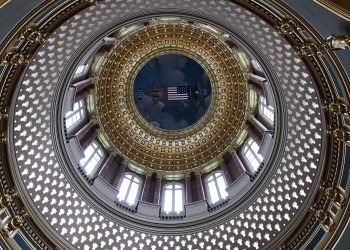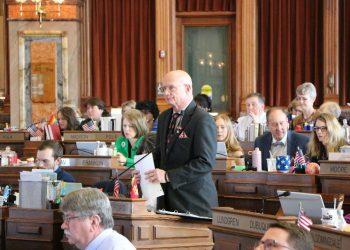(The Center Square) – The Iowa House raised state aid for K-12 school districts Thursday 2.5 percent ($179 million) in its 57-39 vote for HF 2316.
The 2.5 percent growth rate provides a state supplemental aid (SSA) of $181 per pupil. The bill also increases the fiscal year 2023 regular program state cost per pupil by $5, separate from the SSA. FY 2023 state aid from the general fund would total $3.58 billion, up $172 million. State cost per student would rise from $7,227 to $7,413, a 2.57 percent increase. Under the bill, the additional levy portion of the fiscal year 2023 SCPP amount would be frozen at $685 per pupil, regardless of the per pupil increase for fiscal year 2023.
Iowa House Democrats sought a $300 million increase instead, citing Gov. Kim Reynolds’ $300 million in tax relief to businesses paying corporation income taxes, but their amendment seeking a five percent increase for state aid failed 38-57. An amendment to raise the SSA $10 instead of $5, and an attempt to raise student funding for mental health and behavioral services was ruled not germane.
State Rep. Jeff Shipley, R-Birmingham, proposed and withdrew an amendment on the bill that would withdraw the state budget increase if school district employees violated state statute on distribution of hard-core pornography, discouragement of racial stereotyping, or prohibitions on requiring facial coverings.
“I’ve been a vocal ‘no’ on any education spending until we have broad school choice – education freedom across Iowa. That’s been my position since 2019,” Shipley told The Center Square in a texted statement.
He said on the House floor Thursday regarding HF 2316, too many Iowans and students are “slipping through the cracks,” without necessary life skills, such as civics, despite increasing school funding. He recalled his 2019 vote against transportation equity funding because he believed there should be more focus on remote learning, which ended up being part of Iowa’s response to COVID-19. He said his community suffered from the jump to remote learning.
“It seems to me like we’re always responding to yesterday’s problems and we’re really not putting in that time and effort that we need to properly evaluate these issues. … When education is the majority of the state budget, when it affects Iowans’ lives so immensely, this really should be the majority of what we’re doing up here – is really going in depth and examining these things,” he said. “And I haven’t really seen that.”
The House nearly unanimously passed a bill, HF 2315, that would appropriate $19.2 million for the 2023 fiscal year for public schools, based on budget enrollment, that can be used up until the close of the following fiscal year. The funds can be used for employing para-educators, substitute teachers, bus drivers and administrative and support staff due to worker shortages and other school district expenses that have increased due to inflation. Shipley’s was the lone vote against it.
State Rep. David Kerr, R-Morning Sun, the bill’s floor manager, said that he believes the spending of the appropriation would be up to school districts’ discretion and school districts would welcome the funding.
State Rep. Sharon Steckman, D-Mason City, said that the money would be more effectively spent by increasing the SSA because the funding is solely added for one year and bonuses would be taxable “so it wouldn’t amount to very much.”
State Rep. Chris Hall, D-Sioux City, said the bill doesn’t do enough to support teachers.
“We’re not talking about the things that are making it difficult to find these people,” Hall said. “It’s not just about dollars. It is also about what we are projecting here from the legislature.”
Senate Republicans’ tax plans include corporate income tax reductions, and they have proposed a 2.25 percent increase for the school districts, or $163 per pupil, via SF 2204.
Senior Legislative Analyst Ron Robinson told The Center Square Friday via phone that while Iowa state statute says Iowa legislators have to make an SSA deal within the first 30 days of the session, the bills will progress, despite legislators not making that deadline again this year, as they have also failed to do in the past few years.















